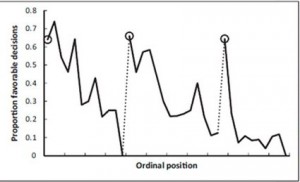 Ever had an important decision to make and been told to “sleep on it”? I bet you’ve never been told to “eat on it”, but after reading about this new research, you just might consider it.
Ever had an important decision to make and been told to “sleep on it”? I bet you’ve never been told to “eat on it”, but after reading about this new research, you just might consider it.
The graph below illustrates the likelihood of a favorable decision from a judge based on when he or she takes a break to eat. At the start of each session, Israeli prisoners were likely to be granted parole 65% of the time, but that certainly was not true right before the judge decided to take a break.
In this study, the results of 1,112 Israeli parole board hearings in a ten month period were analyzed. Looking left to right on the graph, you observe the order the cases were heard each day. The higher a point is plotted on the graph is equal to a higher percentage of prisoners granted parole. The dotted lines are the points in the day when each judge decided to take a break, either for a morning snack or for lunch.
It was clarified that “the judges treated the prisoners equally regardless of their gender, ethnicity or the severity of their crime,” and the judges decisions were also influenced by the evidence of rehabilitation and the chance the prisoner could offend again. This is probably why even those professionals who were observing this trend day after day had not recognized it. It is also important to clarify that the Israeli judges have no control over their daily schedule other than when they choose to take a snack or lunch break.
It was noted that there have been other studies in other professions that illustrate that when we are mentally or physically taxed, we tend to make the default (read: requires less thought) choice. In this research, the default choice would be to not grant parole. Perhaps “sleeping on it” would restore physical and mental energy enough to help you make an important decision, but that is not always an option in the middle of a work day.
How do you restore your energy throughout the day? Do you eat breakfast? Do you skip lunch because you’re trying to get more done? When I was an intern, my supervisor would take a 15 minute nap every afternoon and run on his lunch break to restore himself mentally as he expended some physical energy. He has always been a mentor in keeping all forms of energy (physical, emotional, mental, and existential) at peak performance. Are you really making good decisions if you are mentally or physically drained?
Even if you are taking a lunch break during the day, will it really improve your ability to make good decisions if you are fueling your body on fast food? Food is the body’s fuel. Just like there is premium gasoline for your vehicle, some foods are a much more ‘premium’ way to fuel your body. Your best decisions may come after a good night’s rest and a healthy breakfast.

